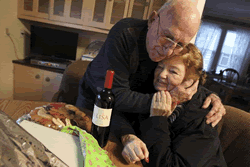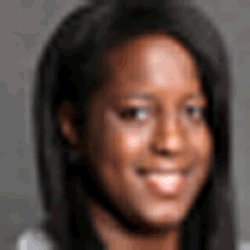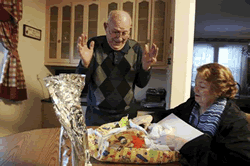Holocaust survivor Marsha Kreuzman ( nee Grunberg ) meets her liberator after 68 years

Joe Barbella, 93, of Union, and Marsha Kreuzman, 90, embrace for awhile after she brought him a Christmas present to his house on Dec. 23. (Saed Hindash/The Star-Ledger)
Print

By Naomi Nix/The Star-Ledger on December 30, 2013
LIVINGSTON — It’s been almost 70 years, but Marsha Kreuzman still remembers the moment she lay outside the steps of a Nazi crematorium wishing she could die.
Kreuzman had already lost her mother, father and brother to the Holocaust, and death seemed inevitable, she said.
But then an American soldier picked up her 68-pound body and whisked her to safety.
"I wanted to kiss his hand and thank him," she said. "From the first day I was liberated, I wanted to thank them, but I didn’t know who to thank."
Since then, the now-90-year-old Livingston resident has been on a decades-long quest to find American soldiers who liberated the Mauthausen concentration camp, one that didn’t have any success until she met Joe Barbella, two months ago, quite by chance.
Their unlikely meeting — and now a budding friendship — has given Kreuzman a pleasant twist to an otherwise-tragic story about surviving the Holocaust.
That tale begins in Krakow, Poland.
After the Germans invaded Poland in September 1939, Kreuzman and her family were sent to the Krakow ghetto. In 1940, her mother was taken to the Majdanek concentration camp, where she was killed.
Marsha Kreuzman says the rest of the family was then taken to the Plashov, a labor camp just outside of Krakow, built on top of two former Jewish cemeteries.
"From the first day I was liberated, I wanted to thank them, but I didn't know who to thank."
There, she recalls, Nazis would punish or kill those who were too sick or weak to work.
"If they were able to work, they would be able to live," said Michael Riff, director of Ramapo College’s Center for Holocaust and Genocide Studies. "It was a matter of life or death.
THE FIGHT TO SURVIVE
It was a strategy Kreuzman and her family would come to know intimately.
"They didn’t let us live, but they didn’t let us die," Kreuzman said.
At one point, Kreuzman didn’t finish building a road because it was raining, and guards responded by beating her with a wet horse’s whip. The scars from knots that were tied into the whip remain on her back to this day, she said. Another time, they hung her upside down on a door for several hours during the night after she tried to visit her brother, she said.
On Yom Kippur in 1943, Kreuzman’s father was found hiding in a ditch, where the camp’s bathrooms were. Nazi soldiers lined up him and dozens of other Jews one by one in front of the camp’s occupants and shot them to death, according to Kreuzman.
"They shot him in front of us," she said.
Her brother, Stephan Grunberg, would be next.
On May 13, 1944, Nazi soldiers rounded up some of the camp’s prisoners, including Grunberg. German doctors inspected each person and sent those they deemed capable of working to the right and those who were considered unable to work to the left.
Grunberg was sent to the left — and later to Auschwitz to be killed. "Then I was alone," Kreuzman said.
In January 1945, Kreuzman and other prisoners were marched for five days and four nights to Auschwitz. She said she was eventually transferred to concentration camps across Eastern Europe: Bergen-Belsen, then Flossenbürg and finally Mauthausen.

Joe Barbella, 93, of Union, reacts to opening up a Christmas present from Marsha Kreuzman, 90, at his home on Dec. 23. Saed Hindash/The Star-Ledger
By that time, Joe Barbella was serving in the 11th Armored Division. Because he had learned to type at Central High School in Newark, when he was drafted into the Army, he was quickly assigned to be a record keeper for the division’s medical unit, he said.
On May 5, 1945, U.S. soldiers from the 11th Armored Division would cross the Linz border in Austria and liberate Mauthausen. Barbella wouldn’t enter the camp with the medical unit until the day after it was liberated, he said.
"When we got there, we saw all these people were skin and bones," Barbella said.
Kreuzman said she remembers lying down just outside the camp’s crematorium when the soldiers arrived. She heard the words: "You’re free."
She fainted and a soldier carried her to a field hospital, where doctors would start nursing her back to health, she said.
HER SEARCH
After the war, Barbella returned to New Jersey, building a comfortable life in Union Township with his wife, Anne.
Kreuzman spent a few years in England before moving to the United States in 1952. For years, she and her husband lived in Union, where she worked as a nurse.
But in the back of her mind, she always wondered about the American men who crossed enemy lines to free her and other Jews from the Austrian concentration camp.
She even wrote letters to men in telephone books she thought might have been connected to the Army division that liberated Mauthausen.
"I always look for liberators," she said. "I wasn’t giving up."
Then, in October, nearly 70 years after her liberation, she came across a wedding anniversary announcement in The Star-Ledger for Joe and Anne Barbella’s 65th anniversary.
"A veteran of World War II, Joseph served in the 11th Armored Division which liberated the Mauthausen concentration camp," the announcement said.
The next day, a tearful Kreuzman called the Barbellas and told Anne Barbella that she was one of the Jews whom Joe liberated.
They arranged a meeting at the Barbellas’ home later that month through the New Jersey Jewish News and the Jewish Federation of Greater MetroWest NJ.
"They really welcomed me with open arms," Kreuzman said about the two-hour visit.
Barbella said he felt like he has known Kreuzman for years, though he shied away from her descriptions of his work as heroic. "I’m just an ordinary solider," he said.
Since they met, the two have become fast friends. Kreuzman talks to the Barbella family regularly on the phone. She even hosted Joe Barbella, his wife and daughter for lunch at her apartment.
And last week she brought him a Christmas gift.
"He deserves to be honored."